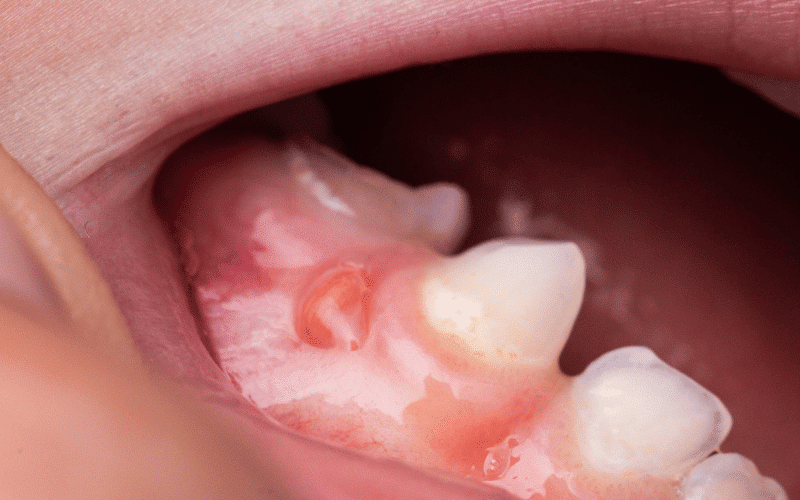
Can Periodontitis Cause Heart Problems?
Gum disease, including periodontitis, is a common oral health issue characterized by inflammation and infection of the gums and supporting structures of the teeth. While the consequences for oral health are well-known, what’s less recognized is the surprising connection between gum disease and heart health.
Recent research suggests that the bacteria and inflammation associated with periodontitis may contribute to heart problems such as cardiovascular disease. This blog explores this intriguing link, exploring how oral health practices impact cardiovascular well-being and the potential implications for preventive healthcare strategies.
Connection Between Periodontitis and Heart Problems
Periodontitis, a severe form of gum disease, has a surprising link to heart problems. Research indicates that the bacteria and inflammation associated with periodontitis can increase the risk of cardiovascular issues like heart disease.
This connection suggests that maintaining good oral health may be crucial in safeguarding heart health. Understanding and addressing this link could lead to more effective preventive measures against gum disease and heart problems, highlighting the importance of comprehensive healthcare that considers the interconnections between different aspects of the body.
Risk factors associated with gum disease and heart disease
1. Poor Oral Hygiene: Inadequate brushing and flossing can lead to plaque buildup, a sticky film containing bacteria that contributes to gum disease and heart problems.
2. Smoking: Tobacco use is a significant risk factor for both periodontitis and heart disease. It weakens the immune system, making it harder to fight off infections in the gums and increasing the risk of cardiovascular issues.
3. Diabetes: Individuals with diabetes are at higher risk of developing gum disease, and poorly managed diabetes can exacerbate both periodontitis and heart disease due to increased inflammation and impaired healing.
4. Genetics: Genetic predisposition can influence susceptibility to gum disease and heart problems. Certain genetic factors may make some individuals more prone to inflammation and bacterial infections in the oral and cardiovascular systems.
5. Poor Diet: A diet high in sugar and unhealthy fats can contribute to gum disease and heart disease by promoting inflammation and plaque buildup. Conversely, a diet rich in fruits, vegetables, and lean proteins can help maintain oral and cardiovascular health.
Symptoms of Periodontitis
1. Gum Recession: Periodontitis can cause the gums to pull away from the teeth, leading to the exposure of tooth roots and a “longer” appearance of teeth.
2. Gum Bleeding: Persistent bleeding during brushing, flossing, or even spontaneously, is a common symptom of periodontitis.
3. Persistent Bad Breath: Also known as halitosis, chronic bad breath can be a sign of advanced gum disease due to bacteria in the mouth.
4. Gum Swelling and Discoloration: Inflamed gums may appear red, swollen, and tender to the touch.
5. Loose Teeth or Tooth Loss: As periodontitis progresses, the supporting structures of the teeth weaken, leading to loose teeth and eventual tooth loss if left untreated.
Prevention Tips For Gum Disease
1. Maintain Good Oral Hygiene: Brush your teeth at least twice daily with fluoride toothpaste and floss daily to remove plaque and prevent buildup along the gumline.
2. Regular Dental Check-ups: Schedule routine dental cleanings and check-ups with your dentist or dental hygienist to monitor your oral health and address any issues early.
3. Quit Smoking: If you smoke, consider quitting. Smoking weakens the immune system and increases the risk of gum disease progression.
Also read: The Impact Of Smoking On Your Oral Health
4. Healthy Diet: Eat a balanced diet of fruits, vegetables, whole grains, and lean proteins. Limit sugary snacks and beverages, which can contribute to plaque buildup and gum disease.
5. Manage Stress: Chronic stress can weaken the immune system and exacerbate gum disease. Practice stress-reducing techniques such as exercise, meditation, or yoga to help maintain overall health, including oral health.
Wrap Up!
In conclusion, the link between periodontitis and heart disease underscores the significance of oral health in overall well-being. Research suggests that gum disease can increase the risk of cardiovascular issues, highlighting the importance of preventive measures. Maintaining good oral hygiene, regular dental check-ups, and healthy lifestyle choices prevent periodontitis and potentially reduce the risk of heart problems.
At Singh Smile Care, we emphasize the importance of oral health and encourage everyone to prioritize their dental care. Take action today by sharing this information with others or scheduling a visit to Singh Smile Care for a comprehensive dental check-up. Your smile and heart will thank you.




